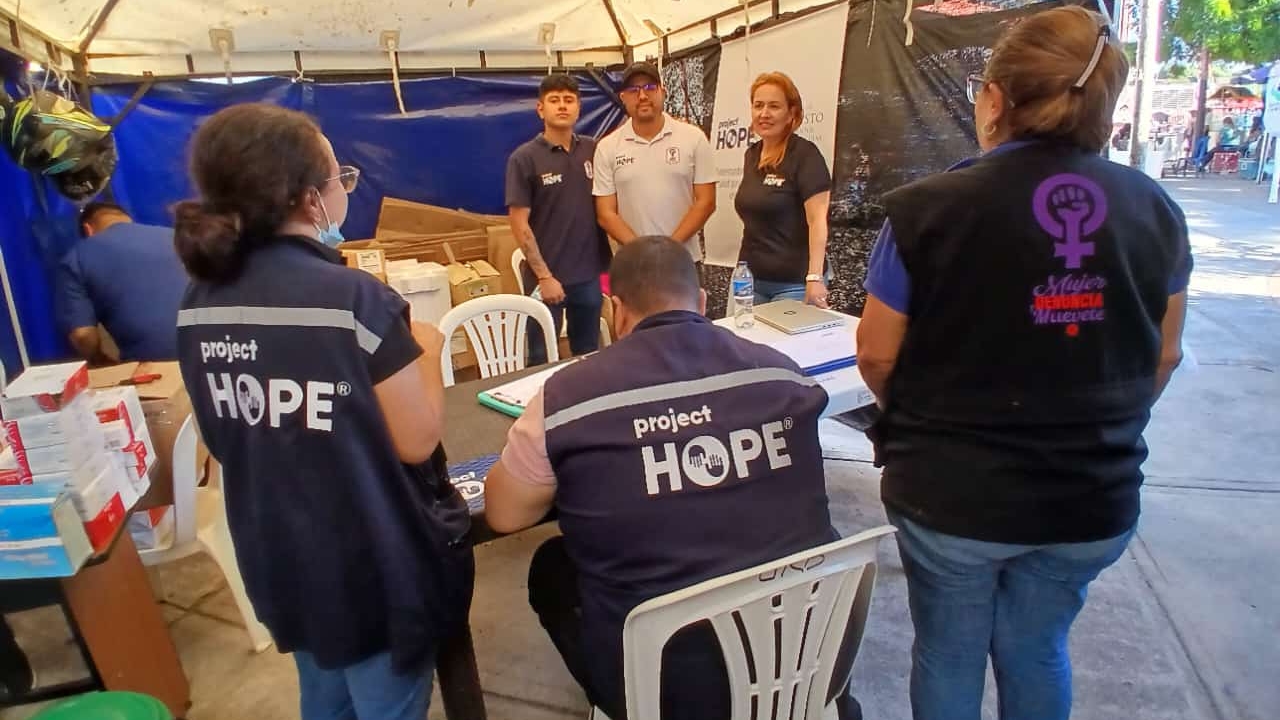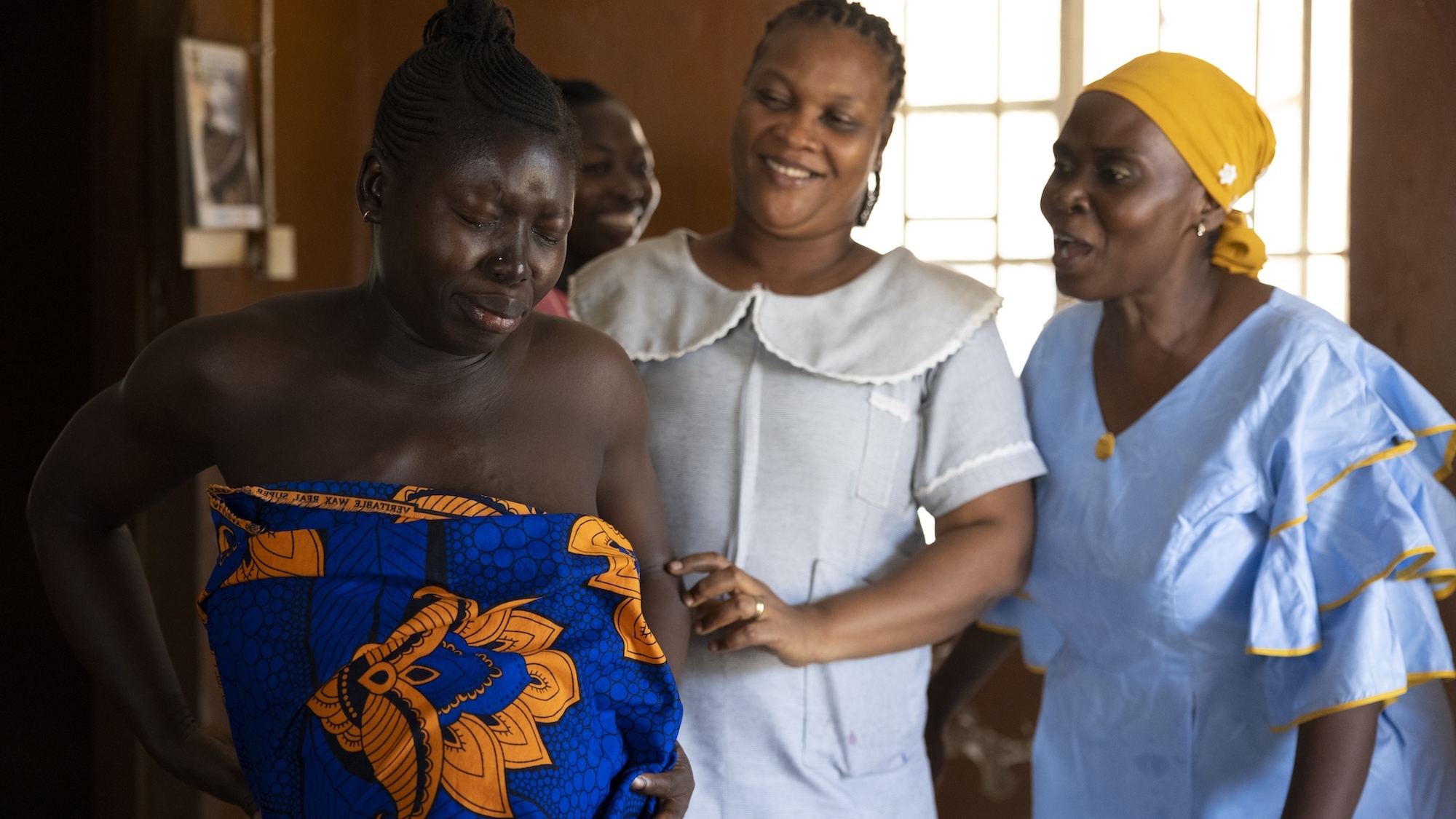Earthquake In Indonesia: What You Need To Know
A powerful 6.2 earthquake hit the Indonesian island of Sulawesi on January 15. At least 40,000 people are displaced, 84 have been killed, and hundreds injured. Learn more about this crisis and how you can help.
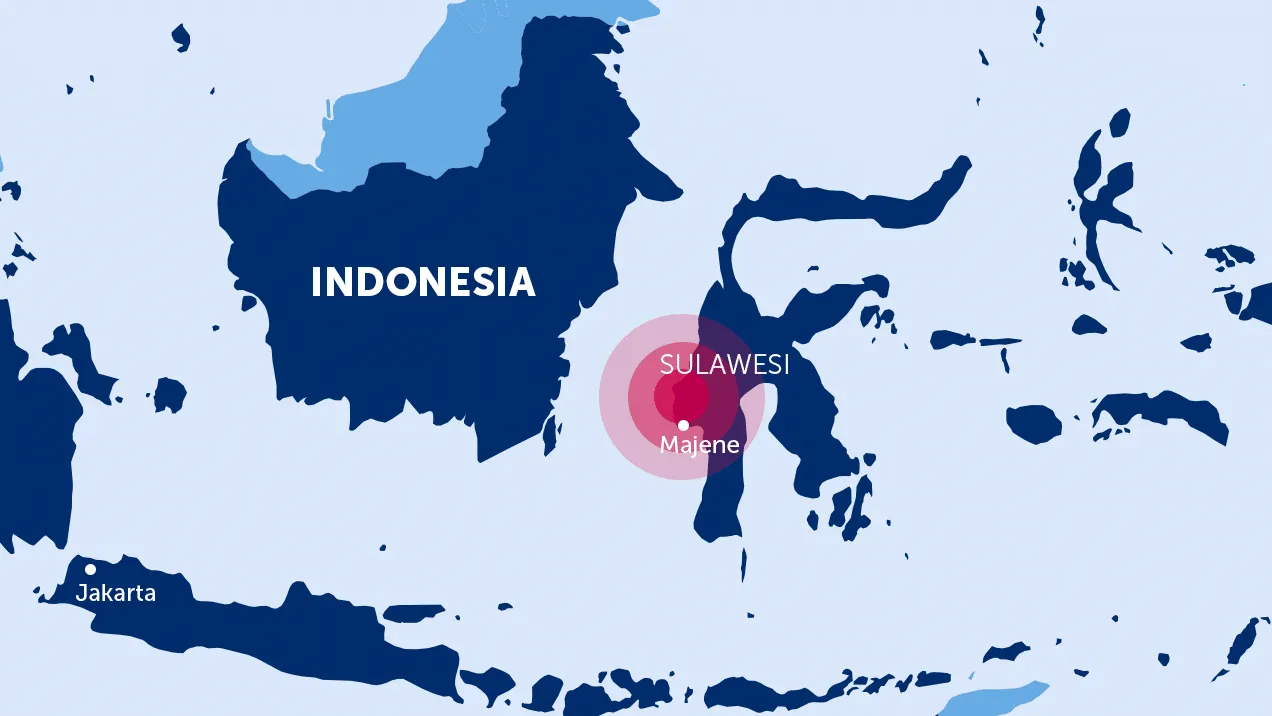
The 6.2 magnitude earthquake that struck West Sulawesi on January 15 continues to impact the delivery of healthcare services in the region. The Indonesian National Board for Disaster Management reports that the earthquake damaged more than 7,850 homes and 22 health centers, leaving some 25,000 people internally displaced.
Multiple collapsed buildings, damaged infrastructure, and public safety concerns are cause for urgent aid and public health emergency response. Our Jakarta-based team is on the ground and assessing the most immediate health needs. Learn more about this emergency and how you can help.
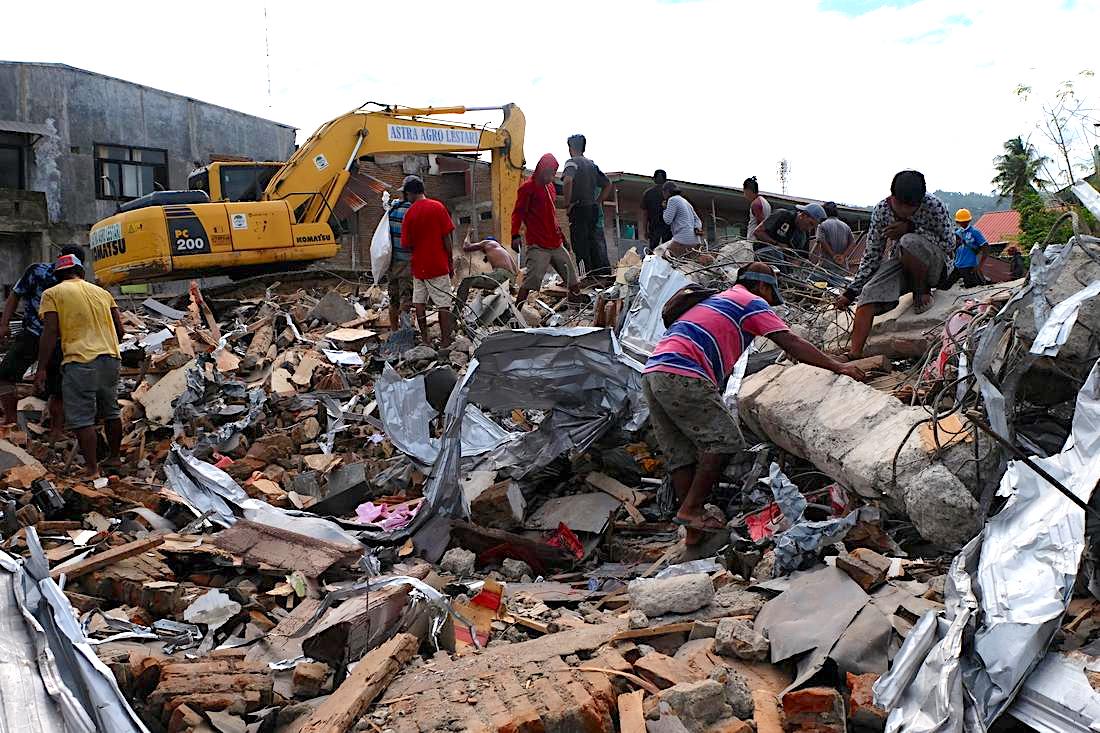
What you need to know:
- A powerful earthquake struck on the Indonesian island of Sulawesi on January 15, injuring hundreds of people and displacing thousands
- Heavy damage has been reported near the cities of Mamuju and Majene, including collapsed buildings
- Multiple aftershocks have already been recorded, exacerbating the damage
- Project HOPE is on the ground and assessing the greatest health needs
What happened in Indonesia?
Early on Friday, January 15, a 6.2-magnitude earthquake struck the Indonesian island of Sulawesi. At least 84 people have been confirmed dead and over 900 people injured. More than 7,850 homes were damaged on the island, along with 22 healthcare centers. Some 25,000 people remain displaced, leading to serious concerns that COVID-19 cases will spike.
The earthquake set off landslides and interrupted the access road between Majene and the provincial capital Mamuju in three different locations. The city of Majene has reported heavy damages to structures, including the Mitra Manakarra Hospital, which collapsed with a number of people inside. Additionally, several primary health care centers, the Governor’s office, two hotels, a mall, a community center, and hundreds of houses have sustained significant damages. Electricity and telecommunication outages continue and there is limited access to Majene due to a landslide following the earthquake and a collapsed bridge.
The area is about 160 miles south of where the 2018 Palu earthquake struck, which triggered a tsunami and killed thousands.
What are the greatest health needs?
With damage widespread, the greatest immediate health needs were injuries and wounds from the earthquake. The potential for subsequent aftershocks, earthquakes, and tsunamis remains a significant concern, and at least one aftershock of 5.0-magnitude has been reported.
Project HOPE’s Emergency Response Team has also identified that primary sources of clean water have been damaged by the earthquake, leaving many without access to clean, potable water. Despite damage to local infrastructure electricity is being restored and fuel and gas suppliers have resumed operations.
Our team reports that since some of the region’s health facilities were built in low-lying, coastal areas, the local population is concerned about visiting them. Health teams establishing themselves following the earthquake have opted for operations on higher ground due to concerns of additional earthquakes and the potential for tsunamis. Health care teams are also primarily establishing outdoor clinics due to concern over the stability of buildings. In addition to injuries as a direct result of the earthquake, the ERT has received reports of hypertension, dyspepsia, neuropathy, fevers, and other cold symptoms.
We are also concerned about the spread of COVID-19, especially with thousands of people displaced and seeking shelter together. Indonesia reported its highest number of COVID-19 cases to date on January 16, totaling more than 14,000 cases.
The ERT reports that the evacuation sites are not set up for effective social distancing, lack sufficient COVID-19 screening systems, and remain underequipped with personal protective equipment for both those residing in the camps as well as for administrators and camp medical staff. The largest evacuation site, Mankarra Stadium in Mamuju, is sheltering approximately 10,000 people without sufficient COVID-19 screening, social distancing measures, or personal protective equipment.
Project HOPE is also anticipating the earthquake to impact health care workers’ mental health as they are actively working to respond to the urgent injuries and health needs while coping with an ongoing pandemic and the earthquake’s impact on their own lives.
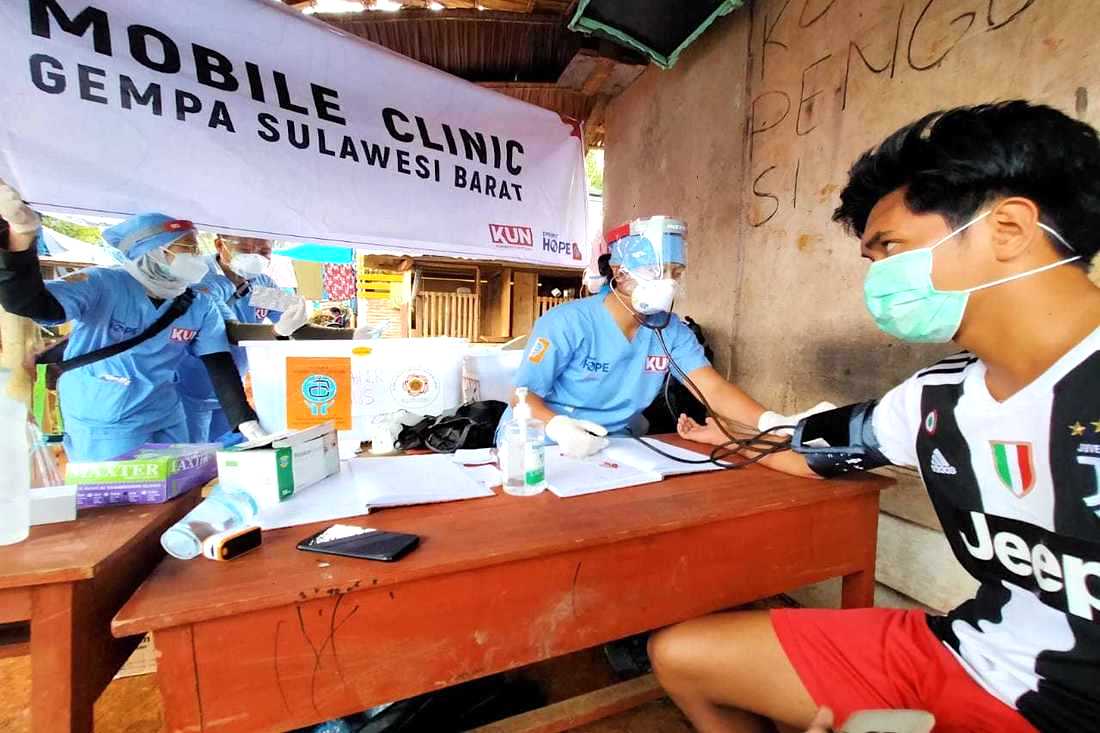
What is Project HOPE doing to help?
Yayasan Project HOPE, a local entity of Project HOPE, deployed an ERT to West Sulawesi to identify needs and coordinate response efforts with local and national responders. The ERT and partner organization, KUN Humanity System (KUN), have assembled emergency medical teams to deliver critical care to populations impacted by the earthquake.
The teams deployed by KUN and supported by Project HOPE are operating in West Tapalang to support the Dungkait Health Center, with one team providing health services and another operating as a mobile unit in the region. The teams have performed medical consultations with more than 500 people. Reflecting the lack of access to healthcare services, significant amounts of patients are presenting with non-communicable diseases like hypertension. The team also reports seeing patients with cold symptoms, and gastrointestinal illness.
Yayasan Project HOPE and KUN are supporting local health authorities’ efforts to establish additional medical screening services in an attempt to reduce transmission of COVID-19 among displaced communities.
Project HOPE has also mobilized local distribution of pharmaceuticals, medical equipment, and supplies to support the operations of the regional general hospital, which is seeing a sustained surge of patients. Donations include masks and gowns to help protect frontline healthcare workers, medical testing equipment such as infrared thermometers and pulse oximeters, and common over-the-counter medications including antacids and cough syrups. Project HOPE continues to examine opportunities to provide and distribute hygiene kits and other non-medical supplies to impacted communities.
Project HOPE responded to the 2018 Palu earthquake and tsunami in West Sulawesi and maintains strong relationships with other local and government areas. In 2020, Project HOPE established an official Jakarta-based Emergency Response Hub, with support from Medtronic. The Hub centralizes Project HOPE’s responses to disasters and crises across South East Asia and maintains a roster of trained emergency responders that can be mobilized and operates in line with international and local standards.
As a global health and humanitarian organization, Project HOPE goes where the need is greatest. To support our emergency relief efforts and our lifesaving work around the world, click here.

